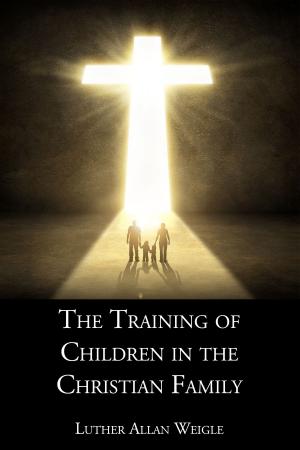That Monster the Higher Critic
Nonfiction, Religion & Spirituality, Christianity, Christian Literature, Bible & Bible Studies| Author: | Marvin R. Vincent | ISBN: | 1230001952247 |
| Publisher: | CrossReach Publications | Publication: | October 4, 2017 |
| Imprint: | Language: | English |
| Author: | Marvin R. Vincent |
| ISBN: | 1230001952247 |
| Publisher: | CrossReach Publications |
| Publication: | October 4, 2017 |
| Imprint: | |
| Language: | English |
Is the Biblical critic a dangerous, devouring beast?
A good many think so: at least a good many have an impression to that effect, which is a quite different thing from thinking. Nevertheless, impressions often carry people farther than intelligent opinions; and just because a mere impression, in seven cases out of ten, is untruthful, and because it cannot give a rational account of itself, and therefore does the more mischief,—it needs to be dealt with.
UNREASONING PANIC
There is a story of a wag who laid a wager that he would break up a country menagerie and circus. Accordingly, when the rustic crowd had duly inspected the elephant and the hyenas, and were seated round the arena eagerly awaiting the entrance of the clown and the bareback rider, he rushed into the ring, waving his hat, and shouting: “Ladies and gentlemen, save yourselves! The Gy-as-cutus has broke loose!!” Dire was the panic that followed; numerous the bruises and scratches; appalling the damage to bonnets and draperies; but the tent was emptied at last, and the farmers and their wives and daughters were jogging homeward and congratulating each other on their escape, when it occurred to some of them to ask: “What is a gyascutus, anyway?”
The story very well illustrates one aspect of the popular attitude towards Biblical criticism. Upon the settled faith and tranquil content of a large body of Christians, breaks the cry, “The higher criticism has broken loose!” It is charging, head on, with smoking nostrils, against the Bible! It means destruction to the faith once delivered to the saints. Meanwhile few stop to ask, “What is higher criticism, anyway?” The majority run; that is, they evade the question with some such irrelevant platitude as “The old Bible is good enough for me.” A few more determined souls, never for a moment doubting that higher criticism, whatever it may mean, is something deadly, “set the teeth and stretch the nostril wide,” and solemnly affirm that Higher Criticism must be exterminated and the higher critics suppressed.
Might it not be worth while to ask whether there is any reasonable ground for this panic? “What is the gyascutus?” If we must fight a wild beast it is a great advantage to know the nature and the habits of the animal, and whether he can do all the damage of which he is said to be capable. It is said that the devil, in the form of an ox, once met Cuvier, the naturalist, and threatened to eat him up, whereupon Cuvier replied, “Can’t do it: graminivorous!” It might possibly appear, on a closer inquiry, that the Higher Criticism is not, on the whole, an evily disposed beast. It might possibly appear, incredible as it may seem, that he delights to browse in the green pastures of the Word, and to drink of the still waters of Siloa’s brook. It might be found quite unnecessary to chain or to muzzle him, even in the dooryards of the defenders of the faith.
Is the Biblical critic a dangerous, devouring beast?
A good many think so: at least a good many have an impression to that effect, which is a quite different thing from thinking. Nevertheless, impressions often carry people farther than intelligent opinions; and just because a mere impression, in seven cases out of ten, is untruthful, and because it cannot give a rational account of itself, and therefore does the more mischief,—it needs to be dealt with.
UNREASONING PANIC
There is a story of a wag who laid a wager that he would break up a country menagerie and circus. Accordingly, when the rustic crowd had duly inspected the elephant and the hyenas, and were seated round the arena eagerly awaiting the entrance of the clown and the bareback rider, he rushed into the ring, waving his hat, and shouting: “Ladies and gentlemen, save yourselves! The Gy-as-cutus has broke loose!!” Dire was the panic that followed; numerous the bruises and scratches; appalling the damage to bonnets and draperies; but the tent was emptied at last, and the farmers and their wives and daughters were jogging homeward and congratulating each other on their escape, when it occurred to some of them to ask: “What is a gyascutus, anyway?”
The story very well illustrates one aspect of the popular attitude towards Biblical criticism. Upon the settled faith and tranquil content of a large body of Christians, breaks the cry, “The higher criticism has broken loose!” It is charging, head on, with smoking nostrils, against the Bible! It means destruction to the faith once delivered to the saints. Meanwhile few stop to ask, “What is higher criticism, anyway?” The majority run; that is, they evade the question with some such irrelevant platitude as “The old Bible is good enough for me.” A few more determined souls, never for a moment doubting that higher criticism, whatever it may mean, is something deadly, “set the teeth and stretch the nostril wide,” and solemnly affirm that Higher Criticism must be exterminated and the higher critics suppressed.
Might it not be worth while to ask whether there is any reasonable ground for this panic? “What is the gyascutus?” If we must fight a wild beast it is a great advantage to know the nature and the habits of the animal, and whether he can do all the damage of which he is said to be capable. It is said that the devil, in the form of an ox, once met Cuvier, the naturalist, and threatened to eat him up, whereupon Cuvier replied, “Can’t do it: graminivorous!” It might possibly appear, on a closer inquiry, that the Higher Criticism is not, on the whole, an evily disposed beast. It might possibly appear, incredible as it may seem, that he delights to browse in the green pastures of the Word, and to drink of the still waters of Siloa’s brook. It might be found quite unnecessary to chain or to muzzle him, even in the dooryards of the defenders of the faith.















